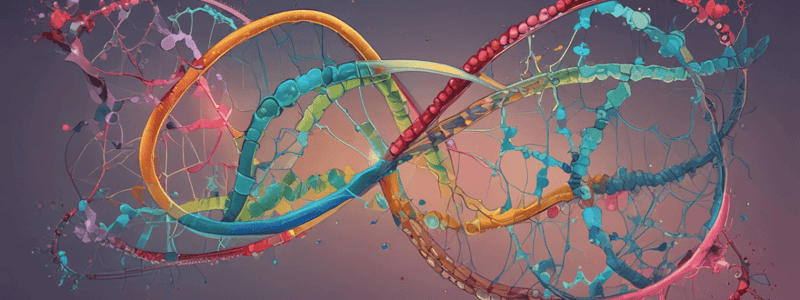Podcast
Questions and Answers
What is the primary function of the spliceosome in RNA splicing?
What is the primary function of the spliceosome in RNA splicing?
- Adding a methyl group to specific nucleotides
- Breaking down RNA molecules into smaller components
- Forming a mature RNA molecule by removing introns (correct)
- Regulating gene expression by binding to messenger RNA
What is the most common form of RNA methylation?
What is the most common form of RNA methylation?
- N7-methylguanosine (m7G)
- 5-methylcytosine (m5C)
- N6-methyladenosine (m6A) (correct)
- 2'-O-methylation
What is the mechanism of microRNA regulation?
What is the mechanism of microRNA regulation?
- Regulating gene expression by adding a methyl group
- Converting adenosine to inosine
- Binding to the 3' untranslated region (UTR) of mRNA (correct)
- Binding to the 5' untranslated region (UTR) of mRNA
What is the function of exoribonucleases in RNA degradation?
What is the function of exoribonucleases in RNA degradation?
What is the function of ADAR in RNA editing?
What is the function of ADAR in RNA editing?
What is the function of RNA methylation in regulating gene expression?
What is the function of RNA methylation in regulating gene expression?
What is the function of microRNAs in disease pathogenesis?
What is the function of microRNAs in disease pathogenesis?
What is the function of the RNA-induced silencing complex (RISC) in RNA degradation?
What is the function of the RNA-induced silencing complex (RISC) in RNA degradation?
What is the function of APOBEC in RNA editing?
What is the function of APOBEC in RNA editing?
What is the primary function of RNA splicing in gene expression?
What is the primary function of RNA splicing in gene expression?
Flashcards are hidden until you start studying
Study Notes
RNA Splicing
- Definition: The process of removing introns (non-coding regions) and joining exons (coding regions) to form a mature RNA molecule
- Occurs in the nucleus, prior to translation
- Involves the spliceosome, a complex of RNA and proteins
- Types of splicing:
- Constitutive splicing: Default splicing pattern
- Alternative splicing: Different splicing patterns resulting in multiple isoforms
- Splice variants: Different isoforms due to alternative splicing
RNA Methylation
- Definition: The addition of a methyl group (-CH3) to specific nucleotides in RNA
- Types of RNA methylation:
- N6-methyladenosine (m6A): The most common form of RNA methylation, involved in splicing, translation, and stability
- 5-methylcytosine (m5C): Involved in RNA stability and translation
- 2'-O-methylation: Involved in RNA stability and translation
- Functions:
- Regulates RNA stability and translation
- Involved in RNA splicing and processing
- Plays a role in stem cell maintenance and development
MicroRNA Regulation
- Definition: MicroRNAs (miRNAs) are small non-coding RNAs that regulate gene expression by binding to messenger RNA (mRNA)
- Mechanism:
- miRNAs bind to the 3' untranslated region (UTR) of mRNA
- Inhibits translation by blocking the ribosome or inducing mRNA degradation
- Functions:
- Regulates gene expression in development, cell differentiation, and cell proliferation
- Involved in disease pathogenesis, including cancer and neurological disorders
RNA Degradation
- Definition: The process of breaking down RNA molecules into smaller components
- Mechanisms:
- Exoribonucleases: Break down RNA from the 3' end
- Endoribonucleases: Break down RNA internally
- RNA-induced silencing complex (RISC): Degrades RNA targeted by miRNAs
- Functions:
- Regulates RNA levels and quality control
- Involved in response to stress and cellular defense
RNA Editing
- Definition: The process of altering the nucleotide sequence of RNA molecules after transcription
- Mechanisms:
- ADAR (adenosine deaminase acting on RNA): Converts adenosine to inosine
- APOBEC (apolipoprotein B mRNA editing enzyme, catalytic polypeptide): Converts cytosine to uracil
- Functions:
- Regulates gene expression and RNA function
- Involved in RNA splicing and translation
- Plays a role in immune response and defense against viral infections
Studying That Suits You
Use AI to generate personalized quizzes and flashcards to suit your learning preferences.




